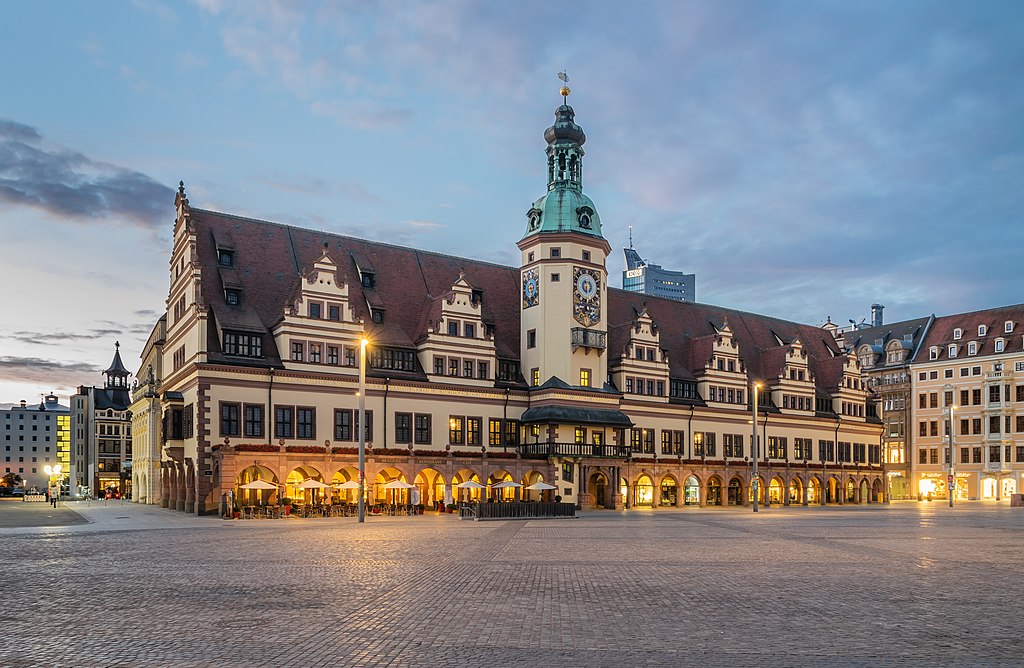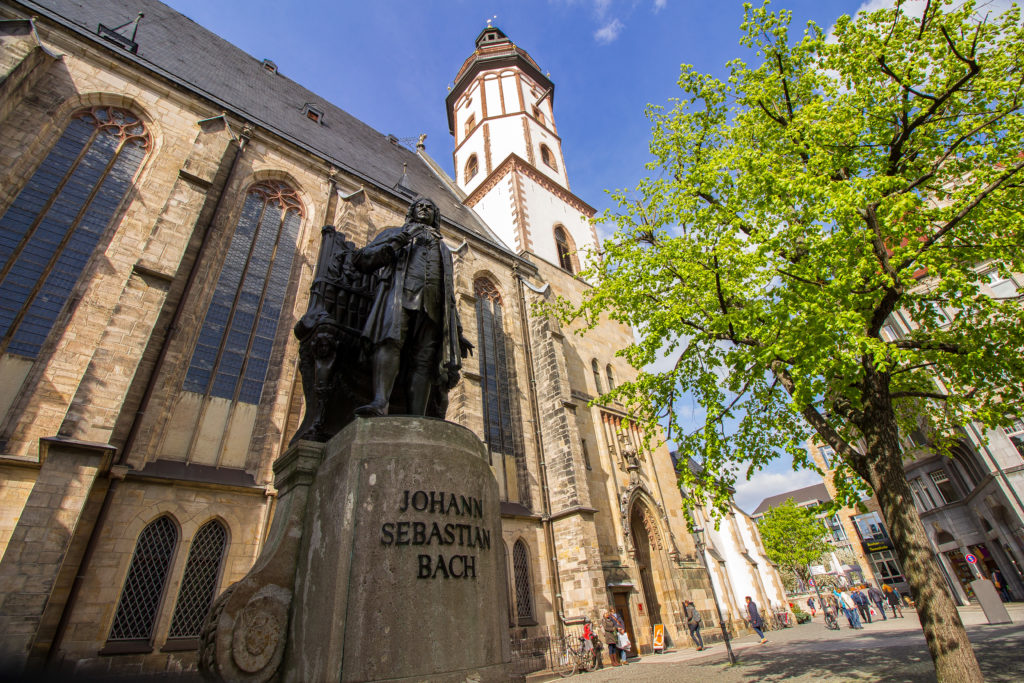Our multi-award winning travel writer MAL ROGERS visits a city that lives and breathes music, and eats sausages
 The Rathaus (City Hall) of Leipzig
The Rathaus (City Hall) of Leipzig BACH, Beethoven, bratwurst and barbed wire. That used to sum up Leipzig. But thankfully the barbed wire has gone following the dismantling of the Iron Curtain.
That leaves Bach, Beethoven and bratwurst - and much more besides.
Leipzig is exciting and relaxing and enticing, a destination for the avid concert-goer and the casual visitor. The Riverside Forest splits Leipzig in two. Cycle or walk along the river from one end of the city to the other, around ten miles. It’s the perfect way to get the pulse of the city and its laid-back citizens.
For less outdoorsy pursuits, Leipzig also delivers. You could dance yourself silly alongside Leipzig’s beautiful people at Club L1. Speaking as someone who only dances if nobody really is watching, I instead headed for Moritzbastei for a few steins of beer and, yes, bratwurst, enjoyed within vaults originally part of the old city walls. Angela Merkel, while a student at Karl Marx University, helped restore the structure.
No matter where you go in Leipzig, music hangs on the breeze, Buskers with hurdy gurdys performing on the old cobbled streets, international players with their Amati cellos or Stradivarius violins heading for the concert halls.
Leipzig, as you quickly gather, is an intensely musical city. Johann Sebastian Bach is the most famous of its musical sons, having served as the Cantor of St. Thomas Church.
The people in Leipzig will tell you that Bach was the best at anything by anyone who ever lived. A bold claim, but it would be hard to argue against it. Just listen to St. Matthew Passion which he wrote in the city. Leipzig honours the composer with its annual Bach Festival (this year 12 to 22 June 2025) more info here
 The statue of Bach outside Thomaskirche (image Tom Williger for Leipzig Travel)
The statue of Bach outside Thomaskirche (image Tom Williger for Leipzig Travel)The city was also home to Mendelssohn, the Schumanns (Felix Schumann and his talented wife Clara) as well as Edvard Grieg of Peer Gynt fame. The Norwegian composer apparently liked the city, but not the music school: “I must admit that I left Leipzig Conservatory just as stupid as I entered it.”
Concert halls, galleries and festivals across Leipzig are dedicated to this astonishing musical culture. The Museum of City History in the Old Town Hall holds huge archives of that endeavour. Poetry too — Friedrich Schiller wrote the lyrics of Ode to Joy here; Beethoven, a Bonn man, subsequently set these to music. It is, as I’m sure even the most avid Brexiteer knows, the beautiful anthem of the EU.
The Gewandhausorchester, one of the oldest orchestras in the world, does an excellent job on the piece; goose pimples guaranteed. They regularly play in St. Thomas’ Church, where the remains of Bach lie — and which, incidentally, acted as a rallying point for hugely significant events that unravelled 36 years ago. Leipzig, an old Saxon city, dates back to the 12th century, with a history for which the word ‘chequered’ barely does justice.But its recent 20th century history found the city at the fulcrum of seismic events that swept across Europe.
In 1989 up to half a million people demonstrated in in defiance of the East German authorities and their armed wing, the Vopos, and the Stasis, the secret police.
That year, across eastern Europe, the Iron Curtain disintegrated — and the people of Leipzig were deeply involved.
So how have things been these last thirty-six years?
I met up with a couple I’d got to know over the years, Uli and Imi. We sat in the ancient Auerbachs Kellar on Grimmaische Strasse sipping (OK, slurping) a few steins of the local beer, Ritterguts Gose.
This establishment has been serving the thirsty people of Leipzig for over 500 years. Under ancient oak beams we chatted about politics, history and sausages. The top dog in the sausage world hereabouts is the Thüringer Bratwurst mit Brötchen in the city — sausage in a roll in English; utterly delicious in any language.
Chatting away, we finally wandered up to Leipzig’s palatial Hauptbahnhof, a huge railway station, not to catch a train, but for more sausages. A bewildering array, from the Bratwurst to the Bockwurst, and not forgetting the Brühwurst was on offer. This is a scalded sausage and served with a local mild mustard. It's huge. Only trouble is, 12 hours later you're hungry again.
Some ten minutes southeast of the station, past the Mendelssohn House, and skirting round the Russian Church is the legendary Flea Market at the Alte Leipziger Messe on Deutscher Platz. This is billed as “the finest market in all Saxony” and it certainly sells a great deal of everything, much of it you probably don't want. And even if you really do want that pantomime horse outfit (one was for sale for €50) how on earth are you going to get it on the budget flight home? I suppose you and a mate could prance up the boarding stairs to the aircraft cabin, take your chances. . . no, it wouldn't work, I tell you. The market traditionally takes place each 1st Sunday of the month between March and November,
So, from shopping to politics. During my visits to the city my friends have given me an insight into life in former East Germany. “When the border opened 36 years ago, there was a wonderful sense of freedom,” Uli said. “But then the vision began to, you know, dim. Some ‘Ossis’ [East Germans] felt left behind by the changes.
“That’s still the case. Many older people in particular, still dislike the West, dislike the EU, dislike the German government. They long for the certainties of the old days.
“But young people, of course, they have no memory of what it was like — the good things and the bad things.”
But it would be fair to say that politics in Germany have entered a very uneasy period, so much so that we needed many more steins of beer to thrash the whole thing out.
TO THE visitor Leipzig looks like a city that works. It seems to be run on behalf of its citizens, not the tourists. But I’ve always been pretty much treated the same as a local, even though my German is entry-level stuff.
Of course music truly is universal, and an F# is an F# in any language. Germany has taken that to amazing heights. Why, they even used to have a 'Dial-an-A' telephone line. Back in the days before smartphones and apps that today will play any demisemiquaver or crochet in which ever key you care to ask for, you had to use a tuning fork. Except in Germany. There was a number you could ring that played a constant A — the note that orchestras tune to. It’s maybe still there; I forgot to check. But music does seem to be a part of Leipzig culture in a manner that surpasses most other cities. No weekend goes by without a major musical happening of some sort, so check out the city’s website. Imi, who by this time seemed to be harvesting a forest of Jägermeisters, the local hooch, said: “Monaco’s national orchestra has a bigger orchestra than its army. We would like Germany to go that way,” and with that she toasted all of the world’s musicians. But I have to tell you that with regards the size of the German army, there are different opinions in the country.
Leipzig today is home to a thriving creative scene, covering all the back alleys and crevices of European culture — from performance art to experimental music.
In the transformed former industrial complexes in the city into a thriving underground scene— cafes, clubs, pop-up galleries, ad hoc theatres, performance spaces and alternative studios promote everything from avant-garde art to innovative music. In fact, Leipzig is often called “the new Berlin” although Berliners are liable to respond with “Hype-zig”).
But it’s not hype. I can testify to that.
PANEL OUT
Tourist information: HERE
For orchestra movements: HERE
Hotel:
Victor's Residenz-Hotel Leipzig
Beside the main railway station Victor’s is within walking distance of all of Leipzig’s city centre attractions.
With thanks to Leipzig Tourist Board, Leipzig Travel and Victor's Residenz-Hotel Leipzig
Thanks to Wikimedia Commons for images 1 & 2

